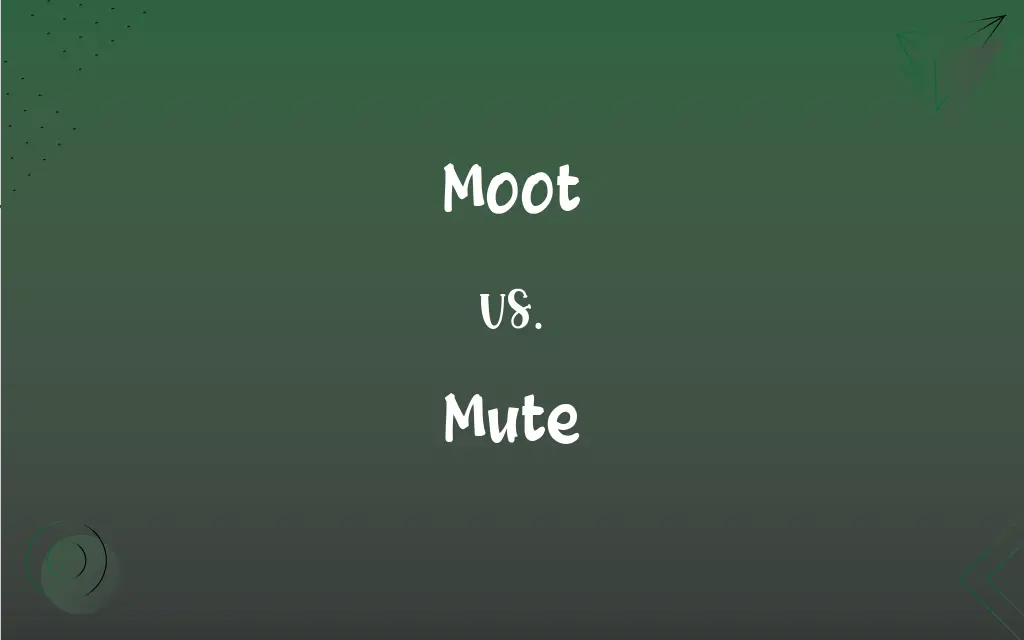Moot vs. Mute: What's the Difference?
Edited by Janet White || By Harlon Moss || Updated on October 24, 2023
Moot is about something being debatable or irrelevant; mute means silent or to silence.

Key Differences
Moot refers to a subject that is open to debate, dispute, or uncertainty, whereas mute relates to an absence of sound or a person's inability to speak.
A moot point might not have a definite answer or might be irrelevant in a given context, whereas a mute button on a device will silence its output.
Legal professionals may encounter a 'moot court,' a mock court in which law students argue imaginary cases, while mute can describe someone who either chooses not to speak or physically can't.
While moot can describe issues that no longer have practical significance, mute can describe musical notes that are softened in tone using specific devices.
One can argue whether a topic is moot, meaning debatable or not settled, but one cannot argue with the mute status of a microphone: it's either on or off.
ADVERTISEMENT
Comparison Chart
Basic Definition
Debatable or irrelevant
Silent or to silence
Part of Speech
Adjective, Noun
Adjective, Verb, Noun
Example Usage
Moot court
Mute button
Associated Phrases
A moot point
Go mute
Synonyms
Controversial, debatable
Silent, voiceless
ADVERTISEMENT
Moot and Mute Definitions
Moot
Open to debate.
The decision became moot after the new evidence surfaced.
Mute
Not making any sound.
The room was mute with anticipation.
Moot
To bring up for discussion.
She mooted the idea of a community garden.
Mute
To silence or suppress sound.
I mute the TV during commercials.
Moot
Of theoretical interest.
The scientist presented a moot concept.
Mute
A person who doesn't speak.
The play featured a mute protagonist.
Moot
A gathering for open discussion.
They attended the moot to discuss community issues.
Mute
Lacking the power of speech.
He was mute but communicated through sign language.
Moot
Having no practical significance.
The results were already in, so the arguments were moot.
Mute
A device to soften the tone of a musical instrument.
The trumpet player used a mute for the soft passage.
Moot
Subject to debate; arguable or unsettled
"It is a moot point whether Napoleon Bonaparte was born a subject of the King of France" (Norman Davies).
Mute
Refraining from producing speech or vocal sound.
FAQs
Can you "moot" a TV's volume?
No, you "mute" a TV's volume to silence it.
Is "moot" derived from any legal term?
Yes, "moot court" is a mock judicial proceeding used for training.
Can mute refer to a person?
Yes, it can describe someone who doesn't speak, either by choice or inability.
Can moot be used as a verb?
Yes, to moot means to bring up for discussion.
Can a mute person communicate in other ways?
Yes, through methods like sign language or writing.
Can a topic become moot over time?
Yes, if it loses practical significance or relevance.
Is moot always about something irrelevant?
No, it can also refer to something debatable or not settled.
Is a "moot point" always a useless point?
Not necessarily. It can also mean a point that is open to debate.
What's the opposite of mute in terms of sound?
Unmute or loud.
Can something be both moot and mute?
Yes, a moot topic can be "muted" or suppressed in a discussion.
Are both moot and mute common in everyday English?
Moot is less common, usually in specific contexts, while mute is more commonly used.
Are "moot" and "mute" related etymologically?
No, they have different origins.
Can mute be used as a verb?
Yes, as in to mute the volume.
Can both moot and mute be used as nouns?
Yes, "moot" can mean a gathering for discussion, and "mute" can refer to a person or a musical device.
If an issue is moot, is it always insignificant?
No, it might simply be open to debate or unresolved.
Can a moot issue be resolved?
Yes, if new information or consensus emerges.
Is mute only about sound?
Primarily, but it can also refer to a lack of speech or communication.
Can you mute a person during a discussion?
In virtual meetings, yes. In real life, it's metaphorical for suppressing their input.
If someone is mute by choice, are they always mute?
No, they might choose to speak at times.
Can an argument be "muted"?
In the sense of being suppressed or downplayed, yes.
About Author
Written by
Harlon MossHarlon is a seasoned quality moderator and accomplished content writer for Difference Wiki. An alumnus of the prestigious University of California, he earned his degree in Computer Science. Leveraging his academic background, Harlon brings a meticulous and informed perspective to his work, ensuring content accuracy and excellence.
Edited by
Janet WhiteJanet White has been an esteemed writer and blogger for Difference Wiki. Holding a Master's degree in Science and Medical Journalism from the prestigious Boston University, she has consistently demonstrated her expertise and passion for her field. When she's not immersed in her work, Janet relishes her time exercising, delving into a good book, and cherishing moments with friends and family.































































